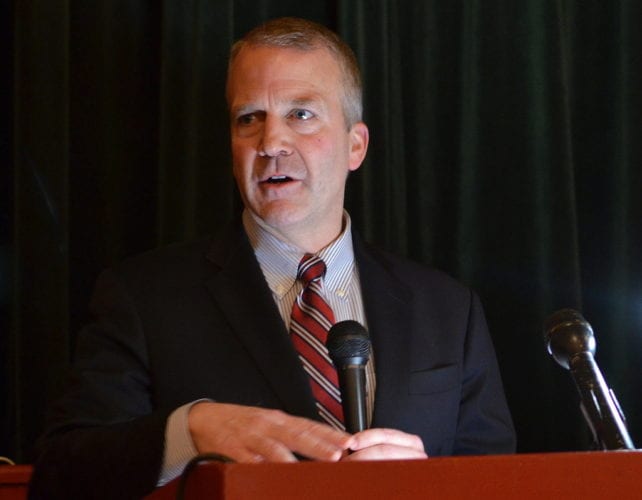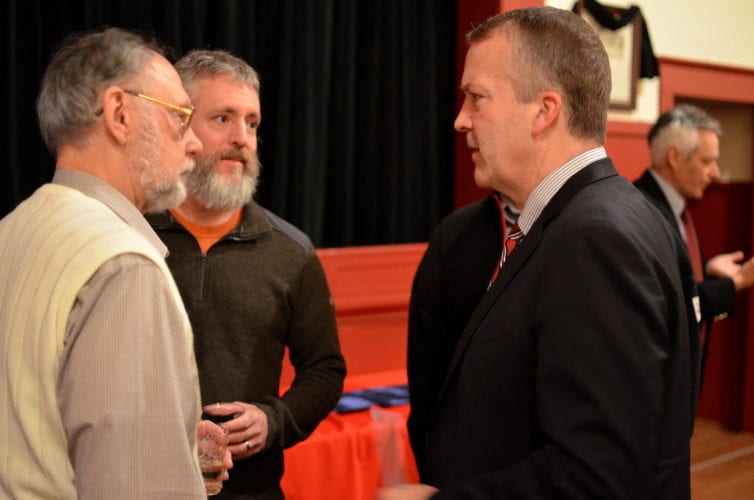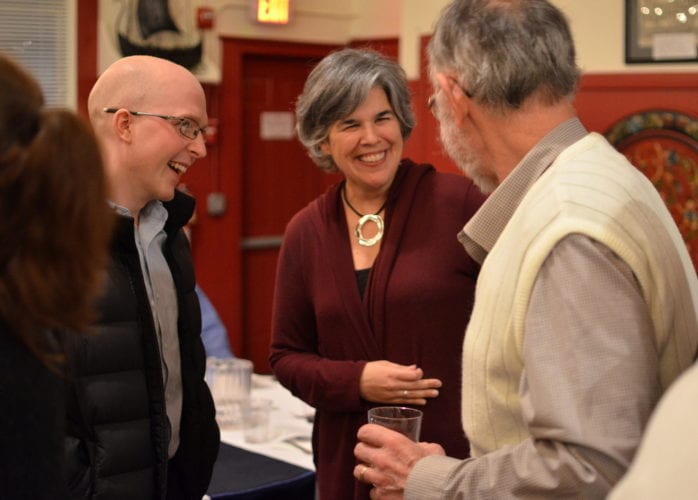
U.S. Senator Dan Sullivan speaks at the Petersburg Chamber of Commerce annual banquet. Photo/Angela Denning
Full interview with KFSK and the Petersburg Pilot:
While in Petersburg Sullivan toured Icicle Seafoods, the town’s largest fish plant and later, spoke at a Chamber of Commerce banquet. There, he told constituents that he was building a relationship with Wilbur Ross, the new Secretary of Commerce, who oversees fisheries. Sullivan says he told Ross that half of the department’s employees and budget deal with fish.
“I said, ‘when I looked at your resume with all due respect, you don’t know anything about fish’,” Sullivan said. “And that’s where I come in.”
Although Sullivan didn’t take questions at the banquet he did meet with constituents and the media the following morning. He took questions from constituents at a local coffee shop. Although the meeting wasn’t advertised, word circulated among friends late the night before and early that morning and about 50 people showed up.
He also made himself available to local media afterward.
Topics ranged from local to national.
Sullivan says Alaska’s new marijuana industry is a state issue. He says he’s been working with state officials on the federal regulations challenging the industry such as banking and prosecutorial discretion. He says he will continue to work with the U.S. Justice Department on those issues because Congressional support is iffy.
“We’ve been looking at federal legislation but the challenge there is only I think five or six states that have done what we’ve done,” Sullivan said. So I don’t know if there is a big amount of support from the legislative perspective.”

U.S. Senator Dan Sullivan speaks with Petersburg Assemblymen Jeigh Stanton Gregor and Bob Lynn at the Chamber of Commerce annual banquet. Photo/Angela Denning
When asked about opening the Arctic National Wildlife Refuge to drilling Sullivan says he’s optimistic about the area known as 10-02, which he says is tiny. He says he’s been working on the issue every day but there is strong, irrational opposition.
Sullivan got out a pen and paper and starting sketching a map to clarify his point.
“This is state land, that’s Point Thompson,” he said. “Exon Mobil and others just spent about $5 Billion developing Point Thompson.”
He says if you move the border five miles over you would essentially be developing ANWR.
“The technology to do this responsibly has increased so, so dramatically since the last debate that what we’re going to try to do is just rationally speak to people about, ‘heh, we’re already doing this’,” Sullivan said.
Regarding immigration, Sullivan says he supports taking a look at the system, in general, for security purposes. He says he knows through a secret security briefing that there are risks right now. But he says the administration could re-do Trump’s executive order to be tighter legally.
“You know, it was rolled out in a way that was confusing and kind of haphazard and it looked like it didn’t have the vetting that that would normally need,” Sullivan said. “And one of my concerns was if that’s focused on protecting Americans, we need to remember that most of our keys allies on the war on terror are actually majority Muslim countries.”
He says the state should focus on the H1B visas, which are non-immigrant visas that allow U.S. companies to hire foreigners with specific skills. That is something that would affect cannery workers in small towns like Petersburg.
As for building a border wall between Mexico and the United States, Sullivan says he doesn’t see it as controversial because many nations secure their borders. He’s not sure how he’ll vote on it because he hasn’t seen details of the cost, which has broad estimates between $15-25 Billion.
“I’ll end up commenting on that and supporting it one way or the other once I see it,” Sullivan said.
Sullivan says he never believed that Mexico was going to pay the U.S. back for the wall like the Trump administration says it would.
A big concern to Southeast Alaska is Canadian mining near waterways that flow into Alaska waters, known as transboundary mining. Sullivan says he recently spoke with Canada’s Prime Minister about it and this was his message:
“I’m a pro-resource development senator, I know Canada is, but you guys gotta work with us here to let us know a little bit more about what’s going on in your mining sectors near Southeast Alaska because if there’s any issues, that’s going to impact our fishing communities,” Sullivan said.
He says he and Lt. Governor Byron Mallot are planning a trip to Canada to visit with officials about the issue.

Other politicians besides Sullivan attended the Petersburg Chamber of Commerce banquet including Senator Bert Stedman and Representative Jonathan Kreiss-Thomkins. Here, Kreiss-Thomkins talks with Petersburg Economic Development Director, Liz Cabrera and Assemblyman, Bob Lynn. Photo/Angela Denning
When asked about funding for ferries, Sullivan said the Alaska Congressional Delegation worked to get state close to $3 billion over the next five years in the Federal Highway Bill.
“When State DOT says they have no money that’s actually not true they have a lot of money,” Sullivan said. “I mean, look, I love Commissioner Luiken, I think he’s a great guy but you know I think this year’s amount was like either $500 or $550 [million] and it’s going to be bumped up by almost $50 million a year for the next four year. And that’s done. We got that done.”
Sullivan in January was named Chairman of the Senate Subcommittee on Oceans, Atmosphere, Fisheries and Coast Guard. As such he says that he hopes to have a say on where the next U.S. Coast Guard cutter will be stationed.
“So I’m going to look into this in a big way,” Sullivan said. “I have no promises. I try not to promise. I try to under promise, over deliver not the other way around but we’re certainly going to look hard at it.”
At the coffee shop meeting, Sullivan was asked about transgender bathrooms. He says it is a state’s rights issue and should be decided by states.
Petersburg Dr. Chris Sargent asked about repealing the Affordable Care Act. The doctor said it’s vital for addicts because it helps them get expensive medication. Sullivan says he’s trying to research the ACA by reading up on it and getting feedback from constituents.
“The reason I haven’t jumped on any plan yet is I’m still doing this,” Sullivan said. “I don’t want to make the call on this is what I’m going to do, this is what I’m going to focus on unless I’ve heard from as many Alaskans as possible. And every single meeting, I learn, my team learns something new.”
Sullivan says something needs to be done with the ACA because it’s too expensive for Alaska’s remote, small population.









